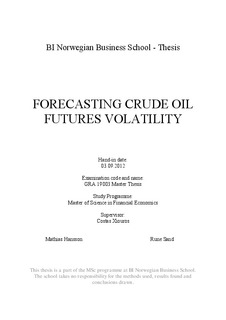Forecasting crude oil futures volatility
Master thesis
Permanent lenke
http://hdl.handle.net/11250/95072Utgivelsesdato
2013-02-18Metadata
Vis full innførselSamlinger
- Master of Science [1621]
Sammendrag
This thesis examines the accuracy of different volatility models in forecasting the volatility of West Texas Intermediate crude oil futures returns. We examine the information content of implied volatility by embedding it as an explanatory variable to GARCH and EGARCH models. The results suggest that even though implied volatility is a highly significant variable for explaining crude oil futures returns, time series models also provide some information that is not accounted for by implied volatility. We also find that the more complex EGARCH model is to be preferred when modeling crude oil futures returns, implying the existence of an asymmetry in the volatility response of futures returns to shocks. The out-of-sample tests conclude that even though implied volatility fail the rationality test, it outperforms both GARCH-type and historical volatility models. Combining time series models with implied volatility adds, on average, no significant information that is not already incorporated in implied volatility. This indirectly gives support to the hypothesis that the crude oil futures options market is informationally efficient.
Beskrivelse
Masteroppgave(MSc) in Master of Science in Financial Economics - Handelshøyskolen BI,2013
